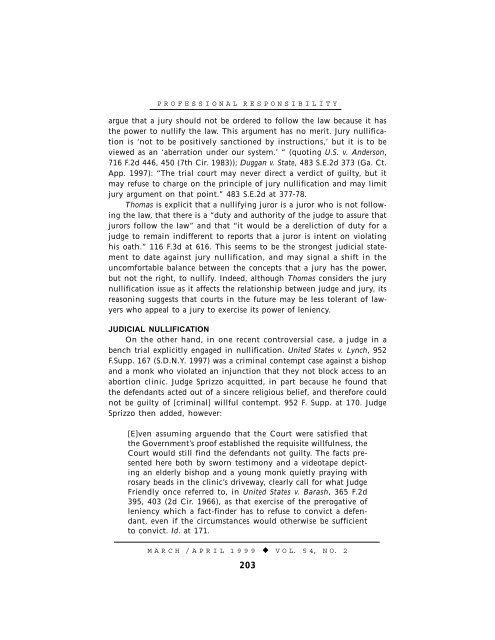THE RECORD - New York City Bar Association
THE RECORD - New York City Bar Association
THE RECORD - New York City Bar Association
You also want an ePaper? Increase the reach of your titles
YUMPU automatically turns print PDFs into web optimized ePapers that Google loves.
P R O F E S S I O N A L R E S P O N S I B I L I T Y<br />
argue that a jury should not be ordered to follow the law because it has<br />
the power to nullify the law. This argument has no merit. Jury nullification<br />
is ‘not to be positively sanctioned by instructions,’ but it is to be<br />
viewed as an ‘aberration under our system.’ “ (quoting U.S. v. Anderson,<br />
716 F.2d 446, 450 (7th Cir. 1983)); Duggan v. State, 483 S.E.2d 373 (Ga. Ct.<br />
App. 1997): “The trial court may never direct a verdict of guilty, but it<br />
may refuse to charge on the principle of jury nullification and may limit<br />
jury argument on that point.” 483 S.E.2d at 377-78.<br />
Thomas is explicit that a nullifying juror is a juror who is not following<br />
the law, that there is a “duty and authority of the judge to assure that<br />
jurors follow the law” and that “it would be a dereliction of duty for a<br />
judge to remain indifferent to reports that a juror is intent on violating<br />
his oath.” 116 F.3d at 616. This seems to be the strongest judicial statement<br />
to date against jury nullification, and may signal a shift in the<br />
uncomfortable balance between the concepts that a jury has the power,<br />
but not the right, to nullify. Indeed, although Thomas considers the jury<br />
nullification issue as it affects the relationship between judge and jury, its<br />
reasoning suggests that courts in the future may be less tolerant of lawyers<br />
who appeal to a jury to exercise its power of leniency.<br />
JUDICIAL NULLIFICATION<br />
On the other hand, in one recent controversial case, a judge in a<br />
bench trial explicitly engaged in nullification. United States v. Lynch, 952<br />
F.Supp. 167 (S.D.N.Y. 1997) was a criminal contempt case against a bishop<br />
and a monk who violated an injunction that they not block access to an<br />
abortion clinic. Judge Sprizzo acquitted, in part because he found that<br />
the defendants acted out of a sincere religious belief, and therefore could<br />
not be guilty of [criminal] willful contempt. 952 F. Supp. at 170. Judge<br />
Sprizzo then added, however:<br />
[E]ven assuming arguendo that the Court were satisfied that<br />
the Government’s proof established the requisite willfulness, the<br />
Court would still find the defendants not guilty. The facts presented<br />
here both by sworn testimony and a videotape depicting<br />
an elderly bishop and a young monk quietly praying with<br />
rosary beads in the clinic’s driveway, clearly call for what Judge<br />
Friendly once referred to, in United States v. <strong>Bar</strong>ash, 365 F.2d<br />
395, 403 (2d Cir. 1966), as that exercise of the prerogative of<br />
leniency which a fact-finder has to refuse to convict a defendant,<br />
even if the circumstances would otherwise be sufficient<br />
to convict. Id. at 171.<br />
M A R C H / A P R I L 1 9 9 9 ◆ V O L. 5 4, N O. 2<br />
203

















